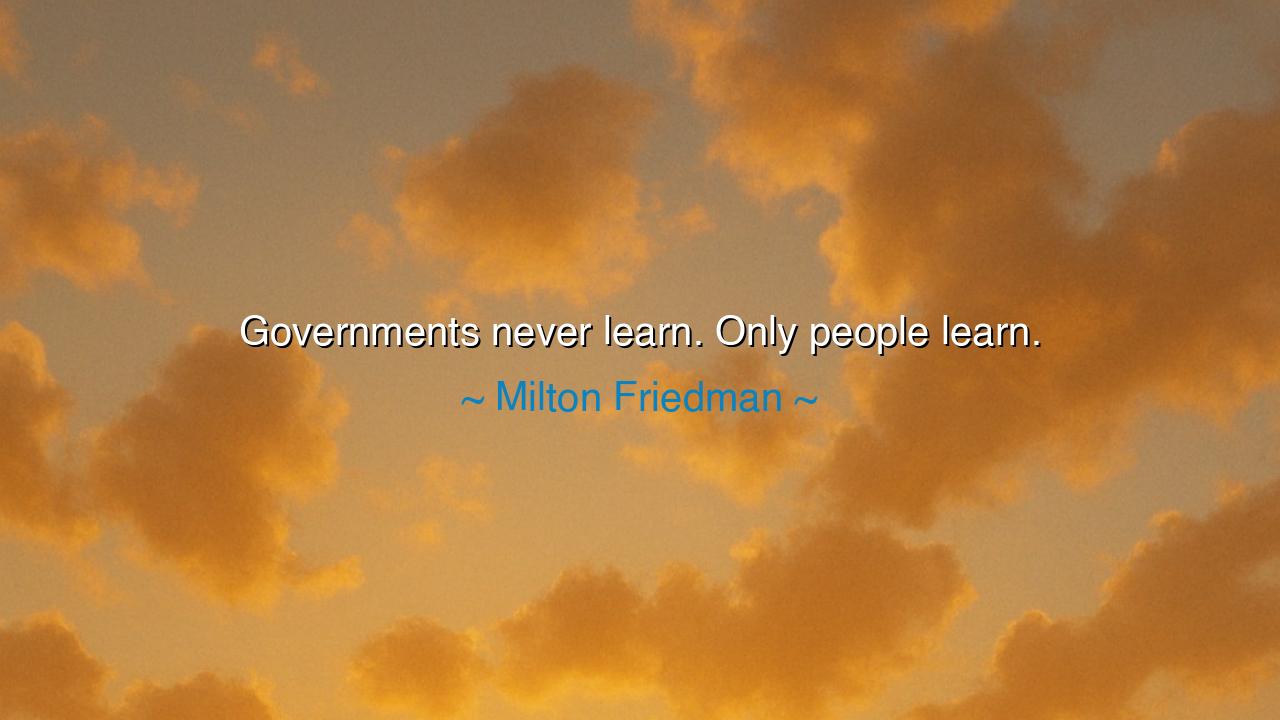
Governments never learn. Only people learn.






There is a piercing clarity in the words of Milton Friedman, the Nobel-winning economist and philosopher of freedom, when he declared: “Governments never learn. Only people learn.” In this simple but powerful truth, Friedman revealed a timeless paradox of civilization — that institutions, no matter how vast or wise they appear, remain bound by rigidity, while the human spirit, ever restless and curious, alone possesses the power to grow, to reflect, and to change. His words remind us that wisdom does not dwell in systems or offices, but in the hearts and minds of individuals — for only people, through experience and suffering, through trial and reflection, truly learn.
Milton Friedman lived and taught during the tumultuous twentieth century, a time when the world was ravaged by depression, war, and the great ideological struggle between freedom and control. He watched as governments — even with good intentions — repeated the same mistakes, expanding power in the name of progress, only to stifle the very liberty that gives progress its breath. He saw that the state, like a giant machine, tends to preserve itself above all else. Bureaucracies are designed not to learn, but to endure; they change faces, but rarely their nature. In contrast, the individual, capable of reflection and repentance, is the true vessel of understanding. For only a soul that feels consequence can know wisdom.
To say that governments never learn is not to condemn leadership, but to reveal the limitations of centralized power. A government is a collective without conscience; it cannot feel shame or humility as a man can. When it errs, it blames; when it fails, it reforms in name but not in nature. Yet within the citizens it governs lies the true light of progress — for it is through the hearts of people that truth is reborn after every failure. Friedman’s words echo the lessons of the ancients: that the health of a state depends not on its laws, but on the virtue and vigilance of its people.
History is filled with proof of his wisdom. Consider the fall of the mighty Soviet Union, whose leaders believed that human behavior could be engineered, that freedom could be replaced by command. For decades, the machinery of government imposed its will upon millions, yet the system did not learn from famine, poverty, or repression. It continued, unheeding, until it collapsed under the weight of its own blindness. But the people — the farmers, the writers, the dreamers — learned. They remembered the taste of liberty, the hunger for dignity, and when the moment came, it was they who brought renewal. Governments fell, but human understanding rose.
Even in free societies, the same truth holds. Milton Friedman often warned that when people surrender responsibility to the state, they also surrender their capacity to learn. When governments attempt to solve every problem, they deny individuals the lessons that come from failure and the triumph that comes from perseverance. It is in the crucible of personal struggle that a nation grows wise. A people who learn from their mistakes strengthen themselves; a government that hides its mistakes weakens all. Thus, the wise must never wait for rulers to learn — they must learn for themselves, and by doing so, they teach their rulers.
Friedman’s insight is therefore both political and spiritual. It is not merely about economics or policy, but about the nature of wisdom itself. Institutions are made of rules; people are made of conscience. Institutions forget; people remember. Institutions justify; people reflect. The progress of humanity depends not on the size of governments, but on the moral and intellectual courage of individuals willing to question, to adapt, and to seek truth beyond authority. Only when the people grow wiser do their governments, in time, follow.
Let this be the teaching passed to all generations: do not wait for governments to learn the lessons of freedom, humility, and compassion — learn them yourself. The soul of a nation is not written in its laws, but in the conduct of its citizens. Be vigilant when power grows arrogant, be humble when knowledge deepens, and be bold in the pursuit of truth. The wise person understands that no government can save the world — but each person, by learning, by thinking, by acting justly, can save the world a little.
Thus, Milton Friedman’s words endure like a torch in the dark corridors of history: “Governments never learn. Only people learn.” For it is not through decrees that civilization advances, but through the quiet evolution of human understanding. Let every man and woman, then, be a student of life — willing to learn, to question, and to grow — for in the learning of the individual lies the awakening of the world.






AAdministratorAdministrator
Welcome, honored guests. Please leave a comment, we will respond soon